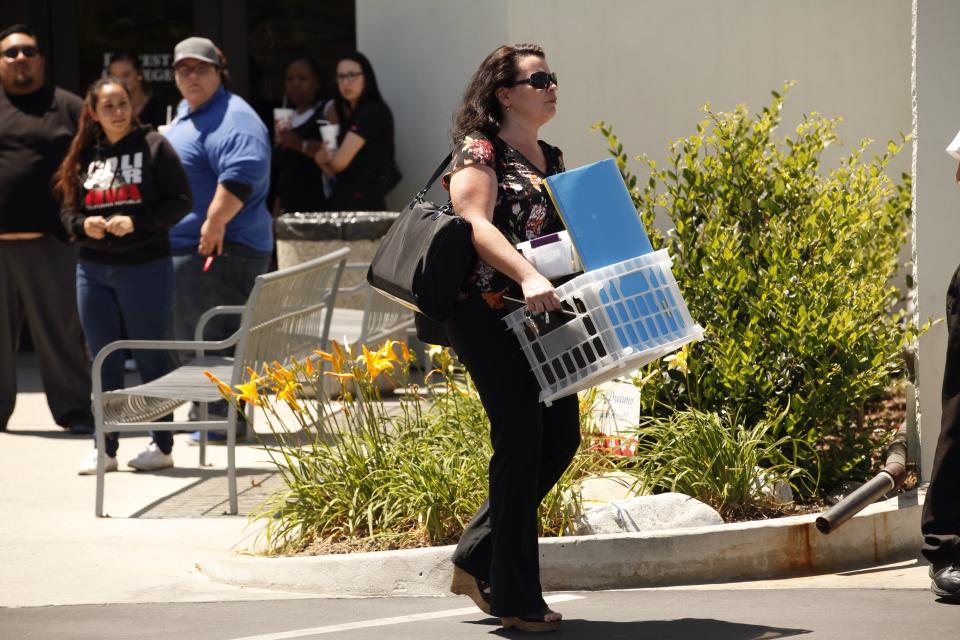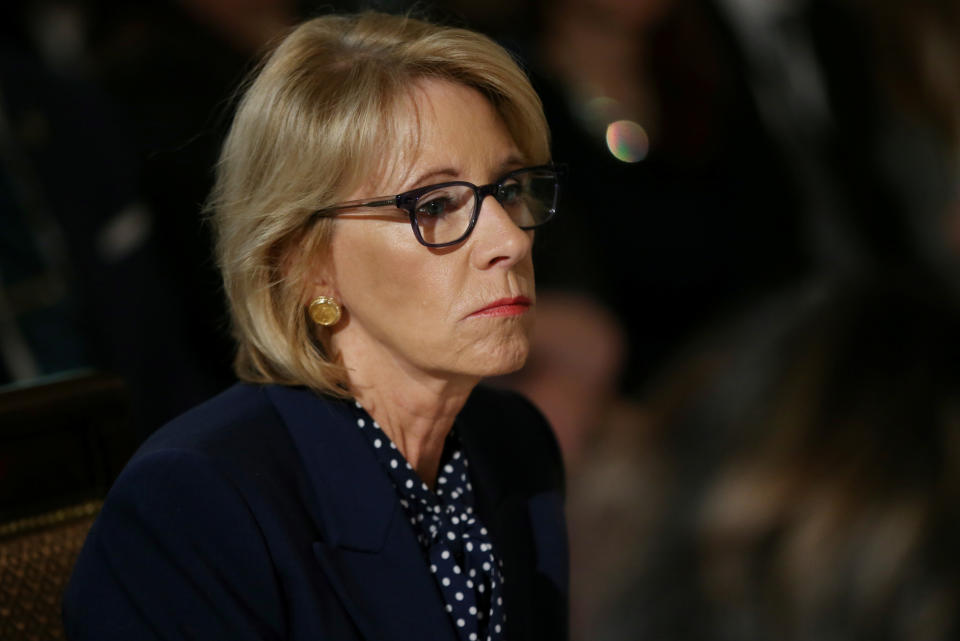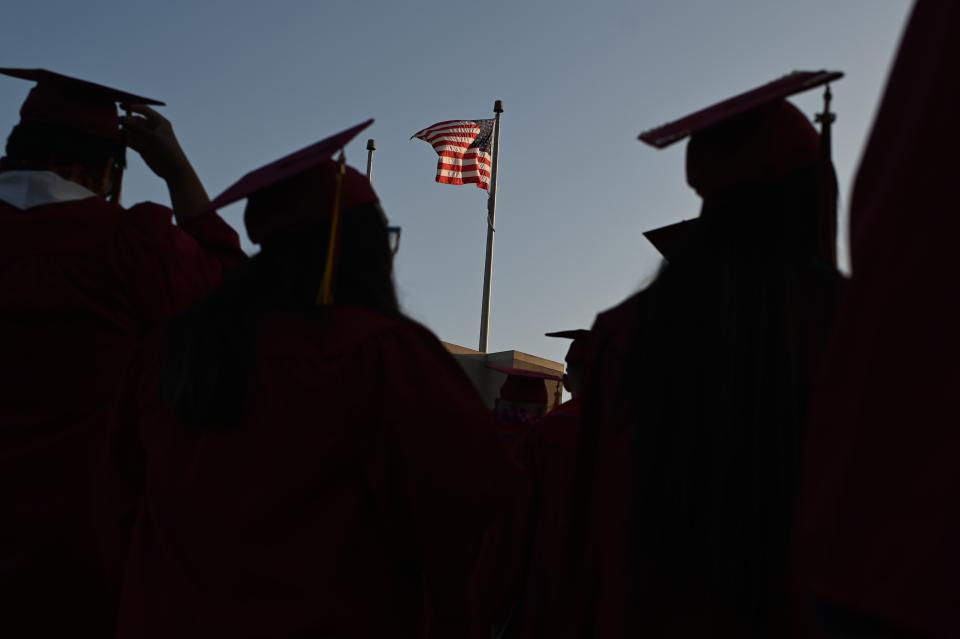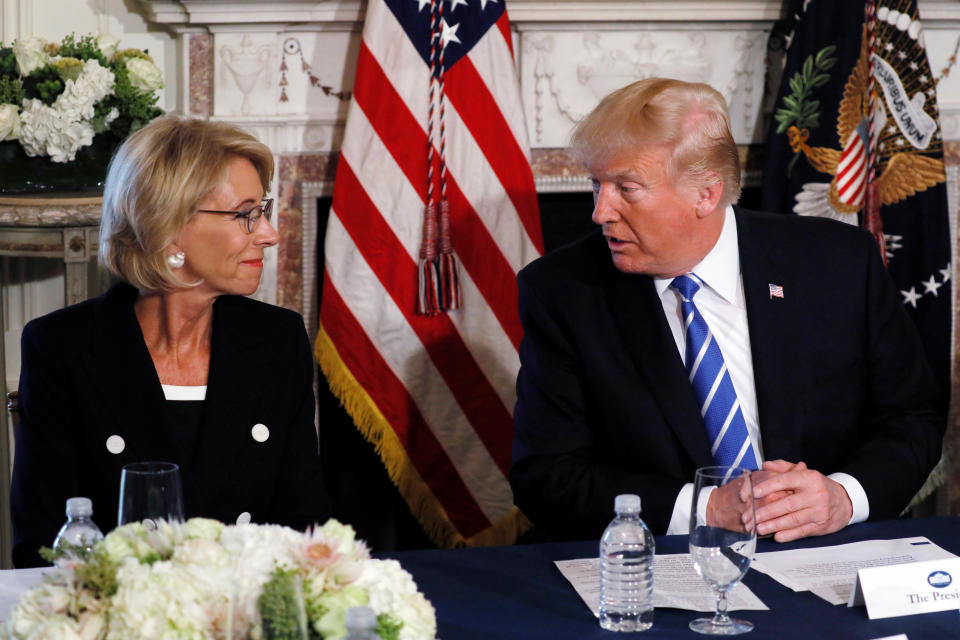'I’m disgusted': Democrats pounce on Trump administration over 'shady for-profit colleges' policy
Democrats are criticizing new rules by the Department of Education (DOE) that will tighten how students of defunct for-profit colleges can claim debt relief.
The rules — set to come into effect on July 1, 2020 — could cut off more students who have attended for-profit colleges shut down and would then be eligible to have their student loans cancelled.
“When shady for-profit colleges cheat students, those students are entitled to get their student loans cancelled,” U.S. Senator Elizabeth Warren (D-MA) tweeted on Wednesday. “That’s the law. I’m disgusted that [Education Secretary Betsy DeVos] is making it harder for defrauded students to have their loans discharged.”
Warren, who has called for a broad cancellation of student debt, previously called DeVos “the worst Secretary of Education we’ve seen.”
Experts in the field argued that the DOE’s latest move demonstrated how DeVos consistently pandered to the interests of for-profit colleges.

"DeVos continues to bend to the whims of the most exploitative schools," Ben Miller, vice president for postsecondary education at the Center for American Progress, said in a statement. "The changes outlined unfairly increase the burden on borrowers, which will continue the green light for predatory activity set by this administration."
DOE data revealed that 85% of undergrads who went to a private for-profit school took out a student loan, compared to 69% who went to a private nonprofit college or 65% who went to a public institution.
“Secretary DeVos has cemented her legacy as best friend to predatory colleges and enemy to the students they rip-off,” The Century Foundation’s Yan Cao said in a statement. “In refusing to process outstanding loan relief applications, and now making it significantly harder for students to show they should get relief in the first place, Secretary DeVos is erasing all pretext that she cares about student borrowers.”
Replacing Obama-era rules
Warren, along with senators Richard Blumenthal (D-CT), Sherrod Brown (D-OH), and Senate Democratic Whip Dick Durbin (D-IL) announced on Thursday that they had sent a letter to the Education Secretary Betsy DeVos asking for the DOE to automatically discharge the debt for the affected students, specifically those who had attended the former ITT Tech.

“[W]e remain concerned about your continued failure to process borrower defense claims, including those from former ITT students,” the Democrats wrote. “As of December 31, 2018, more than 19,000 former ITT students had submitted borrower defense applications, and less than one percent had received any determination… There is no indication that you have taken any action on these applications despite our previous requests.”
ITT Tech, which the Senators call a “predatory for-profit” college, had closed down in 2016, and left more than 40,000 students across 38 states with massive debt and “no avenue to complete their studies.”
Earlier this year, the Consumer Financial Protection Bureau (CFPB) and a coalition of 44 states and D.C. reached a settlement with the lender who had issued high-cost loans to students. The lender had agreed to discharge all the loans.

But the DOE’s new rule proposed to tighten the rules on how those borrowers — and others in the future — could claim relief.
“We believe that within three years, the borrower will know whether or not there has been misrepresentation,” Diane Auer Jones, the Education Department’s principal deputy under secretary, told reporters on August 30.
The new rules involve the DOE raising the burden of proof of loan cancellation for students who say they’ve been defrauded and shortens the duration that students have to seek the cancellation to three years from either the student's date of graduation or withdrawal from the institution.
The DOE also rolled back an Obama-era initiative that provides automatic loan discharge for students who were harmed when the school they were attending suddenly close and were not able to finish their degree at another school. Previously, they would’ve been able to seek automatic relief regardless of whether they fill out the paperwork.

‘If a school defrauds students, it must be held accountable’
The DOE asserted that the new rules came after “more than two years of deliberations” and are aimed at increasing accountability.
"If a school defrauds students, it must be held accountable," DeVos said in a statement. "There is no place for fraud in higher education, and it will not be tolerated by this Administration.”
According to The Century Foundation, the rules would expand the type of loans that were eligible for discharge: Regardless of the status of the loan, borrowers could file for a claim against institutions if they feel they’ve been defrauded. (Previously loans had to be in default status for them to be eligible.)
The new rules also abandoned previous attempts to end discharges if the closed school had offered “teach-out” plans. A teach-out plan is a written plan that transfers the student who is part of a school that has closed down to another. Currently, if the student is part of a teach-out plan, they’d no longer be eligible to have their student debt cancelled.

‘This isn’t a left-right, Democrat-Republican issue’
In the meantime, for-profits continue to recruit students, attracting those who are eager to obtain a degree and are willing to take on huge loans to finance it.
“This isn’t a left-right, Democrat-Republican issue. This is really about who gets the short end of the stick when for-profit colleges defraud students and taxpayers while executives escape with golden parachutes,” A.J. Angulo, a professor at the University of Massachusetts-Lowell and an expert on for-profit schools, told Yahoo Finance. “These new rules are a gift to for-profit colleges that have a track record of misleading and defrauding students.”
Angulo asserted that a proper solution would involve “cutting off federal student aid to any for-profit that has mislead or defrauded students. If the Education Department took a tougher stance with those committing fraud, we’d see a drop in the number of bad actors out there. But it’s unlikely we’ll see that kind of policy coming from the rule-makers in the current Education Department.”
—
Aarthi is a writer for Yahoo Finance. Follow her on Twitter @aarthiswami.
Read more:
'Severely derogatory': U.S. student debt defaults have 'grown stunningly'
Elizabeth Warren: 'Betsy DeVos is the worst Secretary of Education' ever
'It's too good’: How for-profit colleges entice and hinder Americans
Read the latest financial and business news from Yahoo Finance
Follow Yahoo Finance on Twitter, Facebook, Instagram, Flipboard, SmartNews, LinkedIn, YouTube, and reddit.
